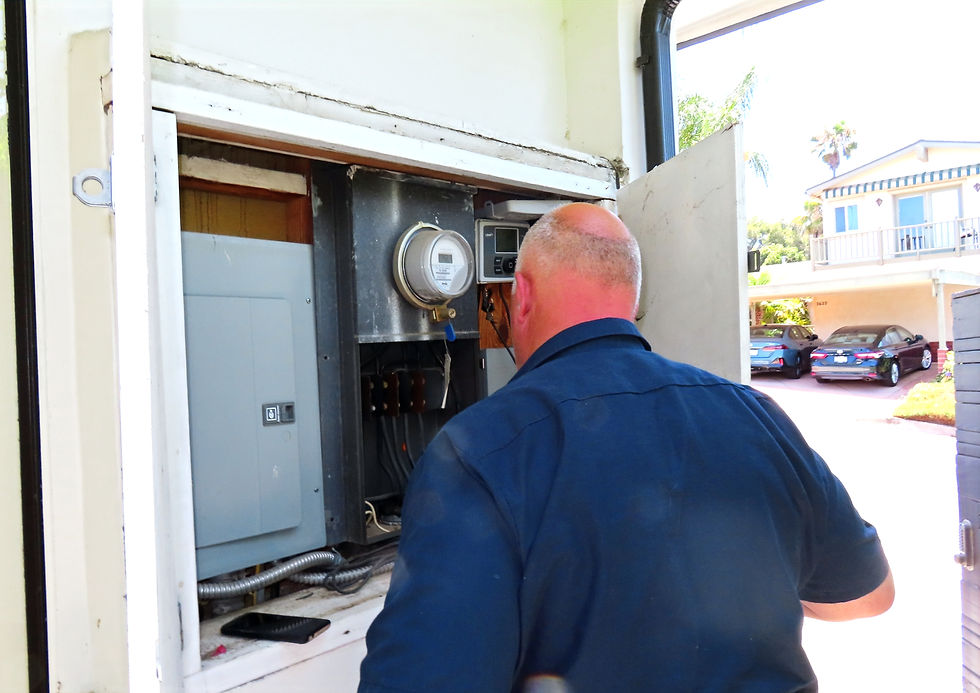The Crucial Role of Home Inspections in Buying or Selling a Home.
- INSPECTION PROS

- Jul 5, 2023
- 3 min read
Updated: Feb 12, 2025
When it comes to buying or selling a home, numerous factors come into play. From location and size to price and amenities, each aspect demands careful consideration.
However, one factor often stands out as pivotal in the decision-making process: the home inspection.
A home inspection is a comprehensive evaluation of a property's condition, aiming to identify any potential issues or defects. In this blog post, we will delve into the importance of home inspections for both buyers and sellers, highlighting their benefits and offering guidance on navigating this critical aspect of real estate transactions.

1. The Purpose and Process of a Home Inspection
A. Definition and Scope
A home inspection involves a qualified professional assessing the structural, mechanical, and electrical systems of a property. This inspection typically covers the foundation, roof, plumbing, electrical wiring, heating and cooling systems, and overall structural integrity.
B. Detailed Examination
During a home inspection, the inspector meticulously examines both the interior and exterior of the property, looking for signs of damage, wear and tear, or potential hazards. They also check for compliance with local building codes and safety regulations.
C. Reporting and Recommendations
After the inspection, the inspector provides a comprehensive report detailing their findings. This report may include recommended repairs, maintenance suggestions, and an estimation of the property's remaining useful life for major components.
II. Importance of Home Inspections for Buyers
A. Uncovering Hidden Issues
A home inspection serves as a valuable tool for buyers, revealing potential problems that may not be apparent during a casual viewing. Identifying issues such as structural defects, water damage, pest infestations, or faulty electrical systems can help buyers make informed decisions and negotiate appropriate adjustments to the price.
B. Negotiating Power
With the information gained from a thorough inspection, buyers can negotiate repairs or concessions with the seller. The inspection report provides evidence to support their requests and ensures that they are not burdened with unexpected expenses after the purchase.
C. Future Planning
The inspection report not only highlights immediate concerns but also provides insights into the long-term maintenance needs of the property. This information enables buyers to plan for future repairs or upgrades and budget accordingly.
III. Benefits of Home Inspections for Sellers
A. Enhanced Marketability
By conducting a pre-listing inspection, sellers can identify and address potential issues before listing their property. This proactive approach demonstrates transparency and instills confidence in potential buyers, making the property more marketable and potentially leading to faster and smoother transactions.
B. Accurate Pricing
An inspection report can help sellers accurately price their property by considering any necessary repairs or improvements. By addressing these issues beforehand, sellers can set a fair price that reflects the true condition of the home, attracting serious buyers and avoiding price renegotiations later in the process.
C. Legal Protection
Completing a home inspection and disclosing the findings to potential buyers can protect sellers from future legal disputes. By being transparent about the property's condition, sellers minimize the risk of claims related to undisclosed defects and ensure a smoother transaction.
IV. Navigating the Home Inspection Process
A. Hiring a Qualified Inspector
To ensure an accurate assessment, it is crucial to hire a qualified and Certified home inspector. Seek recommendations from trusted sources, verify their credentials, and review their experience and expertise.
B. Attending the Inspection
Buyers are strongly encouraged to attend the inspection. This allows them to ask questions, gain a better understanding of the property's condition, and receive firsthand explanations of any issues the inspector identifies.
C. Evaluating the Inspection
Report Review the inspection report thoroughly, paying attention to major concerns and recommended repairs. Seek further clarification from the inspector if needed, and discuss the report with your real estate agent to determine the appropriate course of action.
D. Negotiating Repairs or Adjustments
Based on the inspection report, buyers can request repairs or concessions from the seller. Negotiations can involve monetary adjustments, completion of repairs prior to closing, or agreements on how to handle certain issues.
Conclusion
When it comes to buying or selling a home, the importance of a home inspection cannot be overstated. For buyers, it provides crucial insights into a property's condition and empowers them to make informed decisions. Sellers benefit from increased marketability, accurate pricing, and legal protection. By understanding the purpose and process of a home inspection and navigating it effectively, both buyers and sellers can ensure a successful and satisfactory real estate transaction.
Peace Of Mind Starts With Hiring A Pro
https://www.inspectionprosla.com/















Comments